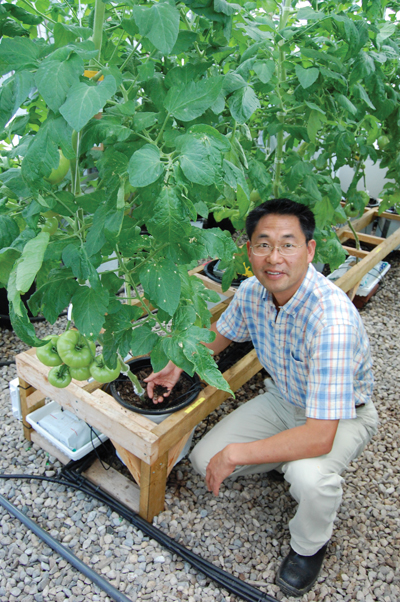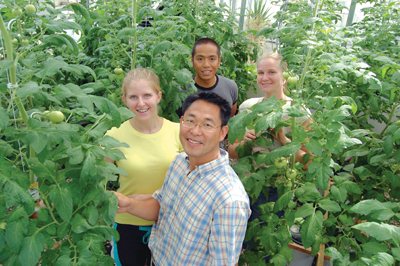
Features
Business
Grower Profiles
Improved organics, from the ground up
September 29, 2009 By Andra Zommers
The demand for organic products in Canada has doubled every four years over the last two decades. But Canada’s low productive capacity for organics has left 80 per cent of the market open to imports. Domestic supply has not kept up with consumer demand.
The demand for organic products in Canada has doubled every four years
over the last two decades. But Canada’s low productive capacity for
organics has left 80 per cent of the market open to imports. Domestic
supply has not kept up with consumer demand.
However, new research at the University of Guelph is working to
reconcile the organic and local food movements, and put more locally
grown organics on Canada’s grocery shelves.
Prof. Youbin Zheng, Department of Environmental Biology, and his team
of researchers are investigating sustainable ways to enhance Canada’s
capacity to produce locally grown organic produce. They’re developing a
greenhouse production system, which will include new organic growing
substrates, and determining optimum fertilization, biocontrol and
irrigation regimens for producing organic greenhouse vegetables.
 |
|
| Prof. Youbin Zheng |
|
 |
|
| Prof. Youbin Zheng (front), with project collaborators (from left) Victoria Surrage, Donny Cayanan and Claudia Lafreniere. |
WORKING ON RESEARCH-BASED GUIDELINES FOR GROWERS
The team’s findings will help create a set of protocols that will
offer Canadian growers research-based guidelines for organic production.
“Canada is at the top of the world in terms of greenhouse production
technology, because we have such a harsh environment,” says Zheng, “but
previous efforts with growing substrates have not been that successful.
There wasn’t enough research to provide growers with information to get
uniform and consistent organic growing substrates.”
Starting from the ground up, post-doctoral research fellow Victoria
Surrage is working with Zheng to design new substrates from waste
materials. Unlike the conventional greenhouse substrate, rockwool (made
from heated rock spun into fibrous slabs), her new substrates use
ingredients such as composted manure, vermicompost (worm castings),
aged bark, coconut coir, perlite and vermiculite.
These substrates will be used in the greenhouse to provide support for
growing plants and to balance their rootzone oxygen and water
availability. Their organic composition will also help to provide
nutrients to the plants. And, unlike rockwool, which is a
non-recyclable material, these new soilless growing substrates will be
biodegradable.
But biodegradable substrates can still benefit from fertilizers, a greenhouse staple.
STUDYING THE BENEFITS OF COMPOST TEA
Master’s degree student Claudia Lafreniere is working with Zheng to
determine the benefits of what’s called “compost tea” for organic
systems. This tea is made by steeping small amounts of compost in large
quantities of aerated water until saturated with beneficial fungi and
bacteria and poured onto plant roots and leaves. Compost tea may help
reduce fertilizer inputs by increasing nutrient cycling in the root
zone compared to direct application.
Lafreniere is also investigating ways to control pathogens in
greenhouse tomato transplants, which can ruin entire crops, with
beneficial micro-organisms. These biocontrols, such as the fungus
Clonostachys rosea (a naturally occurring inoculant, also known as
EndoFine®), offer growers a natural method for protecting their crops
against harmful pathogens without using pesticides.
“It’s like a competition,” says Lafreniere. “If you colonize crops with
microbes that aren’t going to hurt the plants, then the microbes that
do hurt the plants can’t come in and take over.”
The research team is also developing a fertigation regimen for
greenhouse tomato production using new wireless root-zone sensors
engineered by master’s student and researcher, Donny Cayanan. The
wireless sensors are designed to measure electrical conductivity,
volumetric water content and root zone temperature.
FERTILIZER REGIMENS TO OPTIMIZE YIELDS
“We’re trying to determine which irrigation or fertigation regimen is
the most optimum to support plant growth and maximize crop yield,” says
Cayanan.
Ultimately, the researchers hope their findings will help create
protocols for organic farmers that promote a more efficient, profitable
and sustainable organic greenhouse industry in Canada.
Other project collaborators include University of Guelph Profs. Mike
Dixon and John Sutton, Department of Environmental Biology, research
technician Linping Wang and student Matt Hannaberg, as well as Lindsay
Arthur and Amanda Culverwell from the Ontario Ministry of Agriculture,
Food and Rural Affairs.
Funding for this research has been provided by the Ontario Ministry of
Agriculture, Food and Rural Affairs and the Ontario Centres of
Excellence. Additional support has been provided by Forterra
Environmental Corporation, Gro-Bark Ltd., Bluewater Produce Ltd., Dingo
Farms, Adjuvants Plus Inc. and Biofert Manufacturing Inc.
Andra Zommers is a student writer with the SPARK (Students Promoting
Awareness of Research Knowledge) program at the University of Guelph.
Print this page